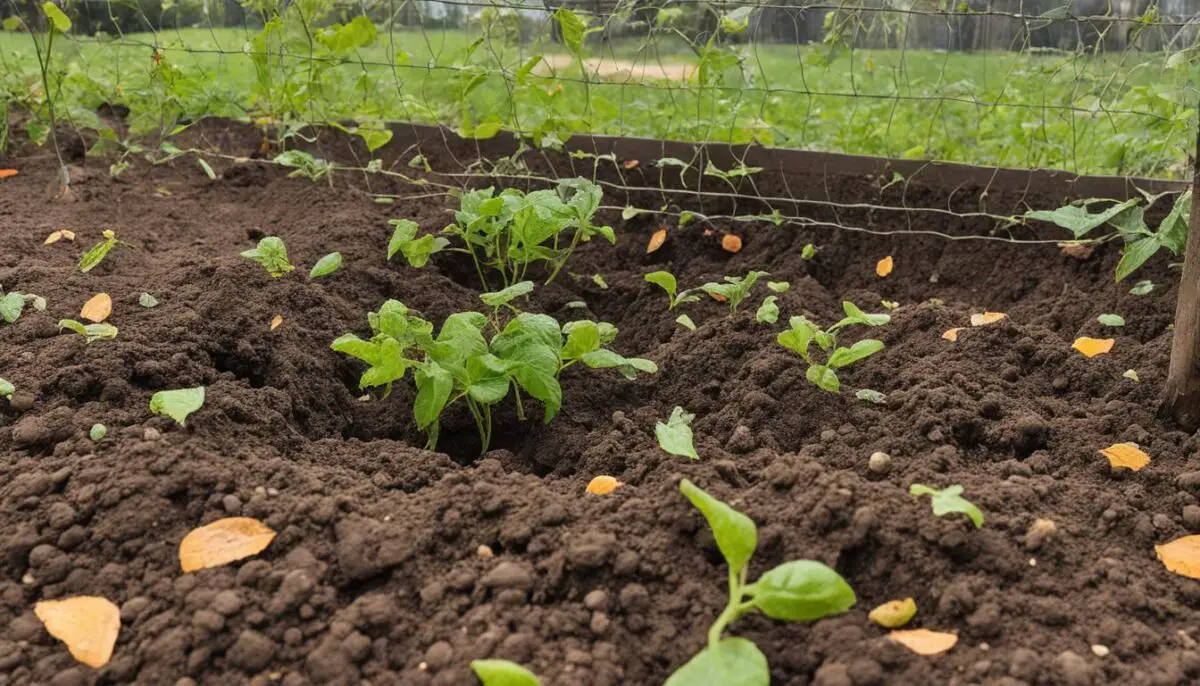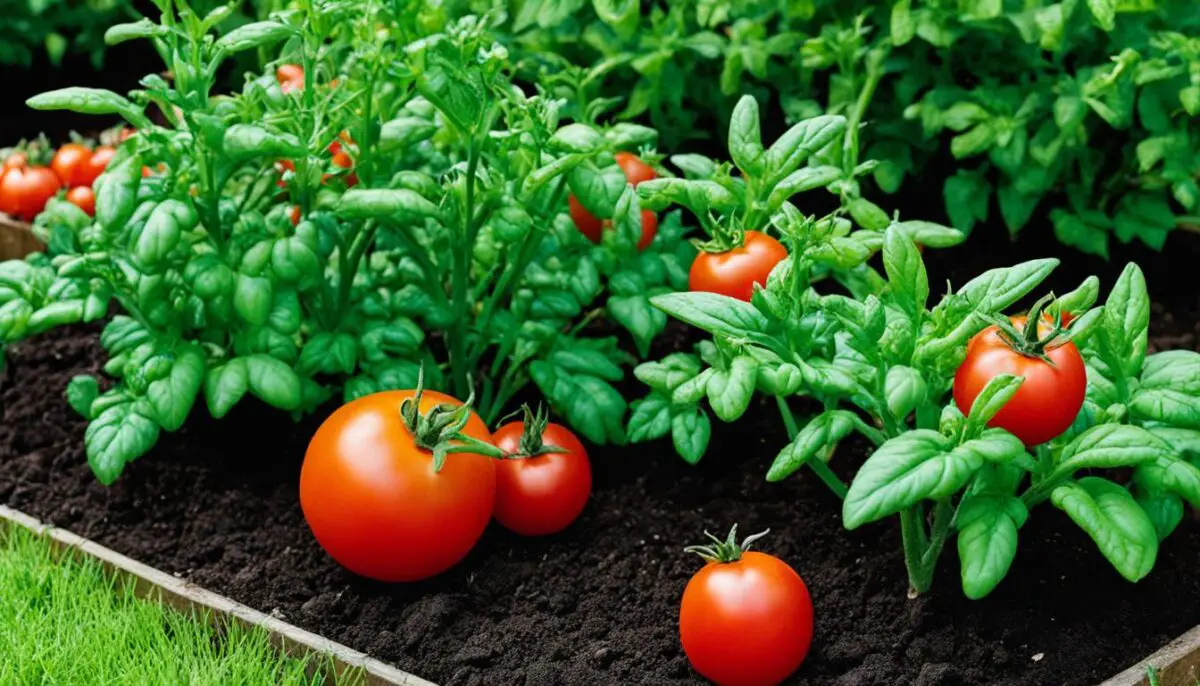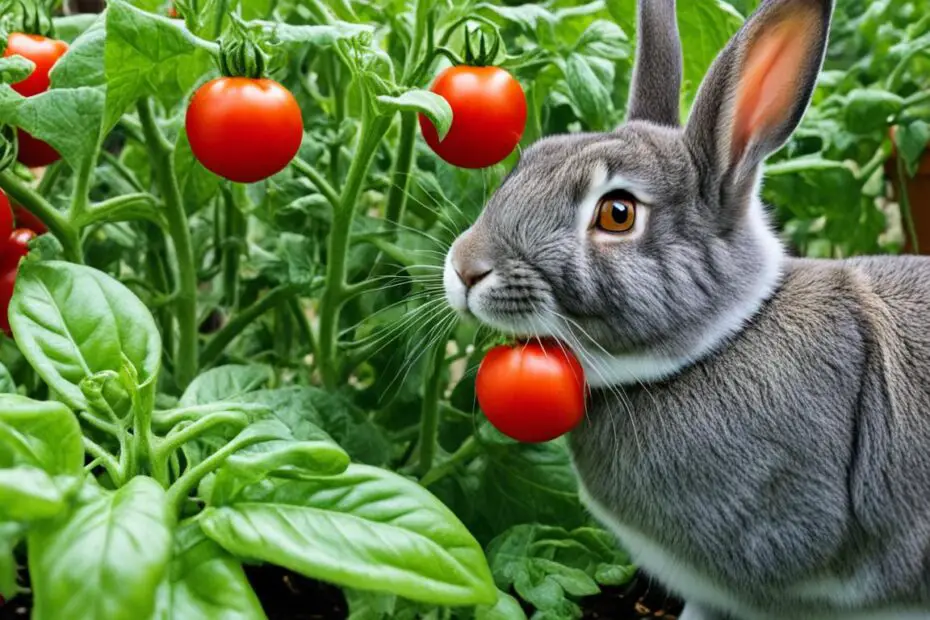When it comes to our beloved tomato plants, it’s essential to know if rabbits have a taste for them. After all, these furry creatures can wreak havoc in our gardens, leaving us with nothing but disappointment. So, do rabbits eat tomato plants? Let’s find out!
Rabbits are notorious for being garden pests, devouring crops with gusto. While they have their favorite snacks like lettuce, beans, and broccoli, they are not shy about nibbling on various other plants, including tomato plants. Signs of rabbit activity in your garden may include small droppings, signs of digging or bedding down, and neatly cut vegetation. But fret not, as there are several effective methods to protect your precious tomato plants from these hungry bunnies.
Key Takeaways:
- Rabbits are known to munch on tomato plants, including the fruit.
- Signs of rabbit activity include small droppings, signs of digging, and neatly cut vegetation.
- Protect tomato plants from rabbits with fencing, netting, scare tactics, repellents, plant selection, and trapping (as a last resort).
- Repellents can be effective in keeping rabbits away from plants, but use caution with edible crops.
- Plant selection plays a role in deterring rabbits, as they have preferences for certain plants.
Signs of Rabbit Activity in the Garden
Rabbits are nocturnal creatures, making it challenging to directly observe their feeding habits in the garden. However, there are several signs that can indicate the presence of rabbits:
- Finding pea-sized droppings: Keep an eye out for small piles or scattered droppings in your garden. Rabbit droppings are usually round and resemble peas.
- Noticing signs of digging or bedding down: Check for evidence of burrows or nests in shrubs and outbuildings. Rabbits often dig shallow holes or create makeshift shelters for resting.
- Inspecting chewed plants with clean cuts: Examine your plants for signs of damage. Rabbits have sharp teeth that leave clean, angled cuts on vegetation.
- Plants disappearing overnight: If young and tender shoots vanish from your garden overnight, rabbits might be the culprits.
By being aware of these signs, you can identify rabbit activity in your garden and take appropriate measures to protect your plants from damage.

Protecting Tomato Plants from Rabbits
When it comes to protecting your precious tomato plants from rabbits, there are several rabbit-proofing methods you can employ in your garden. Fencing and netting have proven to be the most effective strategies in keeping rabbits out.
Fencing: One of the tried and true methods is using fencing to create a physical barrier between your tomato plants and those mischievous rabbits. Chicken wire is a popular choice as it can be easily formed into a cylinder around young or small plants, preventing rabbits from reaching the foliage. This method works particularly well for individual plants or small areas.
Netting: Another effective option is the use of netting, such as bird or deer netting. This lightweight and flexible mesh can be draped over seedlings or young plants, providing a protective barrier. Netting is ideal for larger areas or when you need to cover multiple plants.
While fencing and netting are reliable long-term solutions, there are other methods you can implement to complement your rabbit-proofing efforts:
- Habitat Removal: Rabbits seek cover from predators, so removing potential hiding places can deter them. Clearing brush piles, trimming tall grass, and blocking access to hiding spots can make your garden less appealing to rabbits.
- Scare Tactics: Motion sensor lights and water sprays can startle rabbits and keep them away from your tomato plants. While these tactics may provide temporary relief, they are not foolproof and should be used in conjunction with other methods.
- Plant Selection: Rabbits have their preferences and certain plants are more enticing to them than others. By selecting plants that rabbits tend to avoid, you can reduce the likelihood of them munching on your tomato plants.
Example of Rabbit-Proofing Methods:
| Rabbit-Proofing Method | Effectiveness |
|---|---|
| Fencing using chicken wire | Highly effective for individual plants or small areas |
| Netting (bird or deer netting) | Suitable for larger areas or covering multiple plants |
| Habitat removal | Helps deter rabbits by eliminating hiding spots |
| Scare tactics (motion sensor lights, water sprays) | Temporary solution that can complement other methods |
| Plant selection | Choosing plants that rabbits dislike can discourage feeding |
By implementing these rabbit-proofing methods, you can protect your precious tomato plants from the nibbling jaws of rabbits. Remember, a combination of strategies is often the most effective way to keep rabbits out of your garden and ensure your tomato plants thrive.

Plant Selection and Rabbit Preferences
Rabbits have distinct preferences when it comes to their food choices. By strategically growing plants that rabbits dislike or placing these plants next to ones they prefer, you can effectively discourage them from feasting on your garden.
Vegetables to Avoid
When it comes to vegetables, there are certain options that rabbits tend to avoid. Some of these include:
- Asparagus: Rabbits generally stay away from asparagus plants, making it a good choice for your garden.
- Onions: The strong odor and taste of onions make them unappealing to rabbits.
- Potatoes: Rabbits typically steer clear of potato plants, making them a safe option for your garden.
- Tomatoes: While rabbits may munch on the fruit itself, they usually avoid the tomato plant itself.
Rabbit-Resistant Flowers
Rabbits also tend to stay away from certain flowers. Consider planting these flowers to keep rabbits at bay:
- Cleomes: These beautiful flowers have a scent that repels rabbits.
- Geraniums: Rabbits have an aversion to geraniums, making them a great addition to your garden.
- Wax Begonias: Rabbits typically avoid wax begonias, allowing them to bloom undisturbed.
Unattractive Herbs
When it comes to herbs, there are certain varieties that rabbits find unappealing:
- Basil: The strong scent of basil deters rabbits from nibbling on your herb garden.
- Mint: Rabbits tend to avoid mint plants, making them a desirable addition to your garden.
- Oregano: Adding oregano to your garden can help deter rabbits from feeding on your plants.
By strategically selecting and growing these rabbit-resistant plants, you can create a garden that is less appealing to these furry pests. Incorporating a variety of these plants throughout your garden can help keep rabbits at bay and protect your beloved plants.
Conclusion
Rabbits can pose a threat to your garden, especially when it comes to tomato plants. While they may munch on the fruit, the plant itself is toxic. Protecting your tomato plants and other crops from rabbits is crucial to maintaining a healthy garden. Fortunately, there are several effective rabbit-proofing methods you can implement to keep these pests at bay.
Fencing and netting are highly recommended for creating a physical barrier that rabbits cannot penetrate. By constructing a sturdy fence or using netting around your plants, you can effectively deter rabbits from accessing your garden. Additionally, habitat removal plays a significant role in discouraging rabbit activity. Clearing brush piles and blocking access to hiding places can discourage rabbits from making your garden their home.
Incorporating scare tactics and repellents can also be effective in protecting your plants. Motion sensor lights or water sprays can startle rabbits and make them think twice before entering your garden. Using repellents that make plants taste unappetizing or emit a repulsive odor can also detest rabbits from feasting on your crops.
Lastly, plant selection is an important aspect of rabbit deterrence. By growing plants that rabbits dislike, such as onions, potatoes, and basil, you can reduce the likelihood of rabbit damage. By combining these strategies and being proactive in rabbit prevention, you can safeguard your plants and preserve the beauty of your garden.
FAQ
Will rabbits eat tomato plants?
Yes, rabbits can eat tomato plants, particularly the fruit. However, the plant itself is toxic to them.
Do rabbits eat tomato plants?
Yes, rabbits have been known to eat tomato plants, especially the fruit.
Can rabbits eat tomato plants?
Yes, rabbits can eat tomato plants, but they tend to prefer the fruit over the plant itself.
How do I protect my tomato plants from rabbits?
You can protect your tomato plants from rabbits by using fencing, netting, habitat removal, scare tactics, repellents, and careful plant selection.
How can I prevent rabbits from eating my tomato plants?
To prevent rabbits from eating your tomato plants, you can employ strategies such as fencing, netting, habitat removal, scare tactics, repellents, and choosing plants that rabbits are less likely to eat.
Are tomato plants safe for rabbits to eat?
Tomato plants are toxic to rabbits, so it is best to prevent them from eating the plants.
How can I keep rabbits out of my garden?
You can keep rabbits out of your garden by using methods such as fencing, netting, habitat removal, scare tactics, repellents, and plant selection.
What are some signs of rabbit activity in the garden?
Signs of rabbit activity in the garden include small droppings, signs of digging or bedding down, and neatly cut vegetation.
What can I do to deter rabbits from eating my plants?
You can deter rabbits from eating your plants by using repellents, such as those that release repulsive odors or make plants taste bad.
Do rabbits have preferences for certain plants?
Yes, rabbits have preferences for certain plants. By planting vegetables, flowers, and herbs that rabbits tend to avoid, you can discourage them from feeding on your garden.


